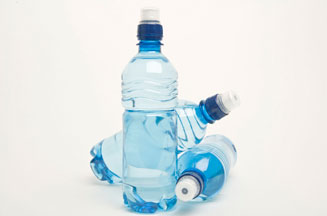
Bottled-water companies will be praying to the gods for a hot, humid summer this year, which might help ease their cur-rent malaise. The high rainfall levels of recent years have not only swelled the UK's reservoirs, but also helped contribute to a decline in bottled-water sales, according to the Britvic Soft Drinks Report 2009.
In total, bottled-water sales fell by 9% in 2008, with Danone's Evian and Volvic recording respective drops of 7% and 13%. Nestlé Waters' Vittel, meanwhile, suffered a crippling 55% fall in sales, which a 5% uplift for its Buxton brand failed to mitigate.
The sector faces wider problems than simply the weather. The argument that bottled water is healthier than old-fashioned tap water has never been convincingly made, and it's easy to see why it has become a discretionary purchase in a recession.
Environmental concerns have also come to the fore, aided by evidence in the BBC's Panorama programme, Bottled Water: Who Needs It?, that a one-litre bottle of Evian or Volvic generates up to 600 times more CO2 in its production than the equivalent volume of tap water. The government's natural resources commissioner has even argued that bottled water should be made as unfashionable as smoking.
Can bottled water buck this trend? We asked Harry Briggs, co-founder of Firefly Tonics, and Marie Ridgley, Managing Director, Added Value UK, who has worked on brand development for brands such as Danone Dairy and Twinings, for their opinions.
Harry Briggs co-founder, Firefly Tonics
Poor old bottled water. Two years ago, strolling back from your Westbourne Grove Powerplate session, your bottle of virgin volcanic-filtered molten-snow was as vital as the latest Louboutins or MBTs. Now, as we tut about penguin-choking plastic islands, carbon footprints and capitalist excess, bottled water is about as in-tune as a mink coat. A reusable bottle called 'tap' is so hip, it's sold out.
The brands have struggled to adapt. Volvic's '1L=10L' campaign is a wonderful idea, but with all those 'touch of' and 'revive' variants, you're now never sure exactly what you are drinking. Even the 'naïve' Evian started plastering its iconic brand on cosmetics. Please.
Over at Nestlé, Buxton has become the bargain brand, permanently eight for £1.95, while Vittel, a brand that always looked too much like German washing-up liquid for my liking, has been left to die.
Meanwhile, the 'bling' waters are competing for the 'Even more stupidly-priced water, what's the world coming to?' tabloid splash, making the industry look gimmicky and irresponsible.
But put the death-knell away. The sun might actually come out this year. And in places that don't have taps, such as cars, tubes and, apparently, Odeon cinemas (try asking), mineral water's still a great deal better than most of the alternatives.
Remedy
- Is mineral water really better than tap? What benefit am I getting for my 79p? Do the research, and tell us.
- Cut the carbon: Belu has done it. Even Fiji is trying. Allay our guilt.
- Make bottled water fashionable again. Bring back glass bottles and aspirational ads. Drop the corny brand extensions.
- After two dreadful summers, please Mr Weatherman...
Marie Ridgley managing director, Added Value UK
The bottled-water sector has had a tough couple of years with sales figures to match. Several substantial factors have contributed to this decline: the lack of sunshine, the rise of sustainability in the public conscience and the recession forcing consumers to focus more on what they put in their shopping baskets.
If we were being cynical, there is also the hive of activity going on within the PR departments of water utility companies, resulting in campaigns such as 'London on Tap'.
Perhaps the real problem, though, is that bottled water has started to leave a bad taste (metaphorically speaking) in people's mouths. Born in the heyday of 80s consumerism, it has yet to carve out a true category benefit that moves it beyond the luxury status in consumer minds. The launch and subsequent failure of Dasani (dubbed 'Peckham Spring') served only to focus attention and cast doubt on the only territory that bottled water had owned in consumers' minds: healthy purity.
In the end, failure to reinforce a true category benefit and build emotional resonance with consumers has left people wondering whether that old joke about 'Evian' being so named because it is ‘naïve' spelled backwards is not merely a coincidence.
Remedy
- Make brands in this category a positive environmental choice, not badges of consumerism, building sustainability into the value equation.
- Reinforce the positive health benefits and purity of the category: to own a stronger benefit/reason to purchase.
- Make the category fun. Drench has started to carve out a more emotive and functional positioning with a positive sales impact.

